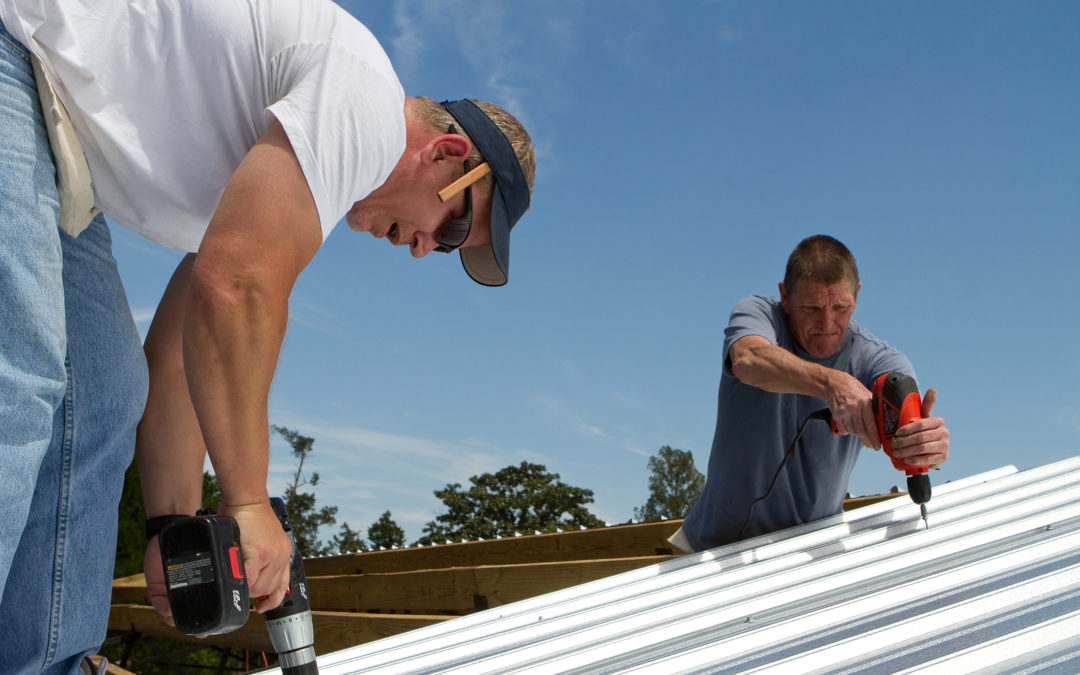Industrial roofs and residential roofs are just not the same. Industrial buildings are much larger and often have flat roofs. The buildings have to handle much more weight. And what the roof is protecting is different. Industrial buildings house all kinds of wares, some of which need precise temperature control or other specific accommodations.
For an industrial property, you need a roof that is up to an important job. For that, you want to know the essential types of roofs.
TPO
Thermoplastic polyolefin, or TPO, is a single-ply membrane that is rolled out onto the roof’s surface. It comes in sheets that are between 10 and 20 feet in width. The sheets are rolled out and heat welded together with a welding robot. TPO is typically white, providing UV reflectivity that helps indoor cooling systems, and is most often used on flat roofs. It’s relatively quick to install and extremely durable. TPO roofs can last up to 20 years or more.
Modified Bitumen
Also known as torch-down roofing, modified bitumen is a single-ply roofing membrane often used on flat roofs. This single-ply membrane is actually made up of several layers of adhesive, reinforced fiberglass or polyester. It’s referred to as single-ply because it’s installed as one piece. Three-foot wide rolls of material are heated with a torch as the material is rolled out onto the surface. A modified bitumen roof is often covered with gravel to protect it from UV rays. These roofs are designed to be flexible in extreme temperatures and can be applied over many other existing roofing materials. The lifespan is 10-20 years.
Built-Up Roofing
Built-up roofing, or BUR, is used on flat roofs and has been around for over a century. These roofs share some similarities with Modified Bitumen, but instead of a single-ply material, built-up roofs are fabricated onsite. They are “built-up” in multiple layers, which can be a combination of tar, asphalt, fabric-like materials like polyester, and gravel. When covered with gravel, it reflects UV rays. It’s low in cost, low in maintenance, and durable.
Metal
Metal roofing is often used on pitched industrial roofs. There is a wide range of options when it comes to metal roofing. Materials include aluminum, copper, tin, stainless steel, galvanized steel, and stone-coated steel. Metal roofing panels can be designed in a variety of patterns and colors. Today’s metal roofing is strong, rust-resistant, and lasts for a long time.
Metal panels are attached to the roof either with an exposed-fastener system, which tends to be less durable, or with a hidden-fastener system. Standing seam metal roofing has hidden fasteners. The result is a durable roof and a distinct look, with raised seams extending the full length of each panel.
Slate Roofing
Slate roofing has been around for centuries. Today’s slate can be found in a large variety of colors and styles. Slate is used on pitched roofs. They’re fire-resistant and if they’re installed and maintained properly, they last a very long time.
Asphalt Shingles
Asphalt shingles are most often used for homes, but businesses can benefit from them as well. Today’s shingles are designed to withstand impact damage and last up to 30 years.
Bert Roofing Repairs and Installs Industrial Roofing in Texas
If you need repair, replacement, or installation for an industrial property, contact Bert Roofing Inc. We’ll look at your building and discuss options with you so you can make an informed decision. When you’re ready, we’ll get right to work on it. You’ll have a reliable industrial roof in no time. Contact Bert Roofing Inc. online or call us at 214-307-8142 today!

